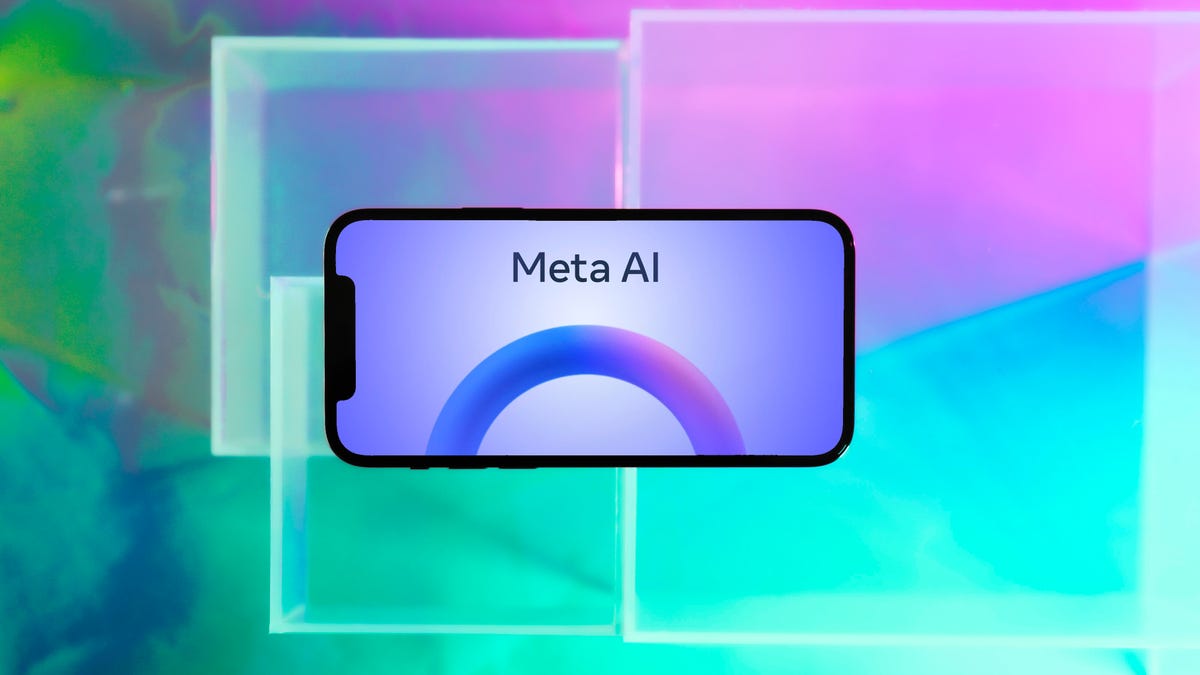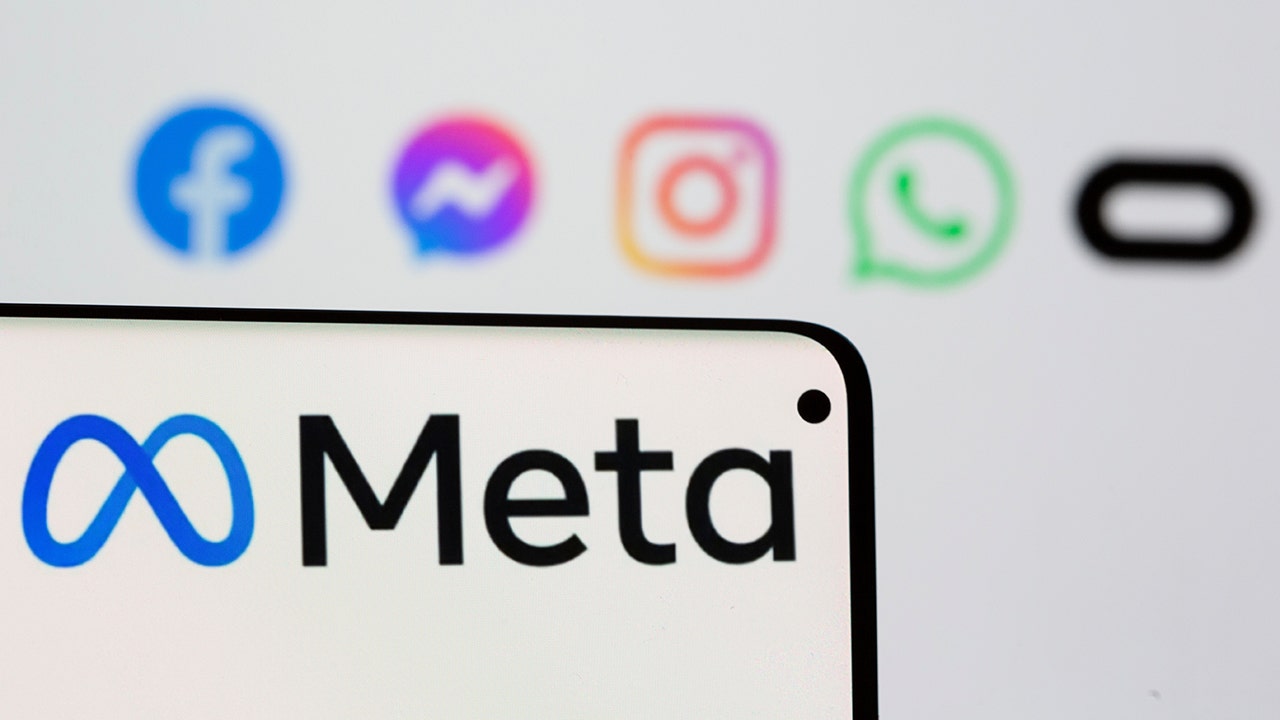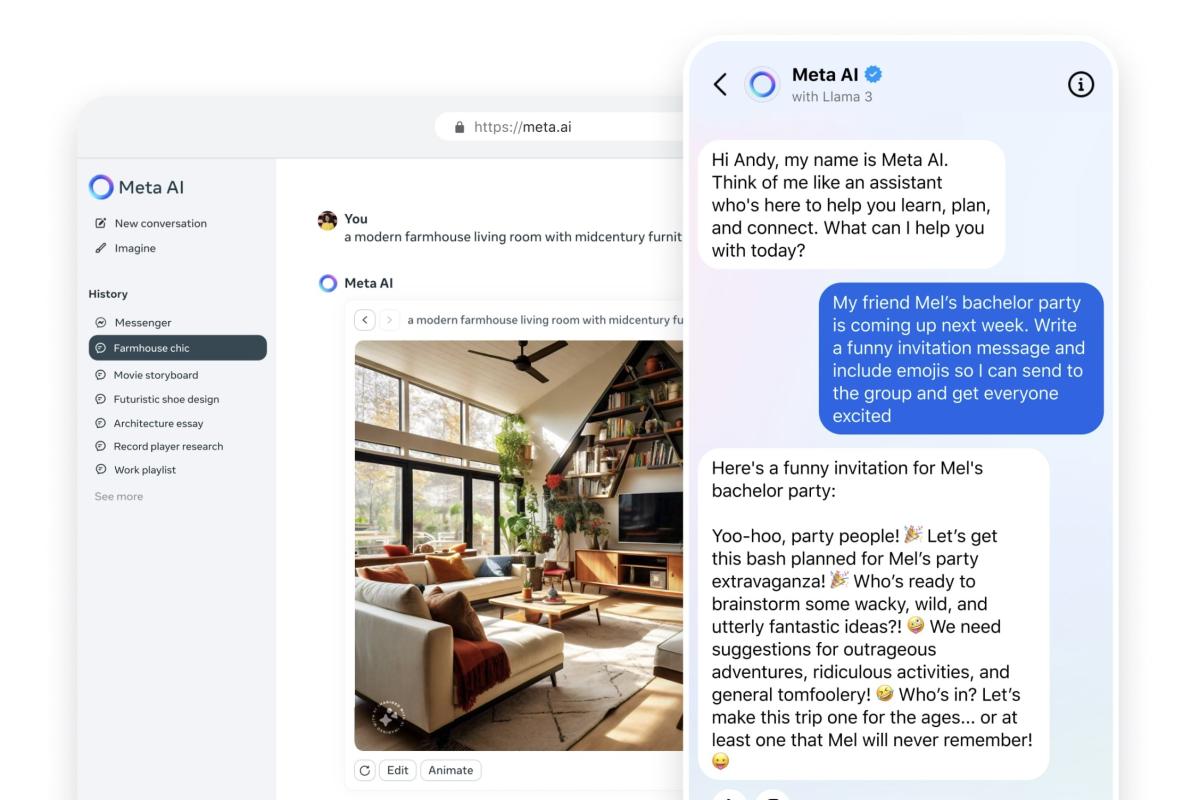
Meta announces the upgrade of its open-source generative AI tool, Meta AI, powered by the more advanced Llama 3 large language model, offering two versions: Llama 3 8B with 8 billion parameters and Llama 3 70B with 70 billion. The company aims to develop a top-tier open model capable of rivaling proprietary AI models. Meta plans for Llama 3 to evolve into a multilingual, multimodal model with reasoning and coding abilities. In benchmark tests, Llama 3 8B outperformed Mistral 7B and Gemma 7B, while Llama 3 70B surpassed Google Gemini Pro 1.5 and Anthropic's Claude 3 Sonnet.

LLaMA (Large Language Model Meta AI) is a family of autoregressive large language models (LLMs), released by Meta AI starting in February 2023. For the first version of LLaMA, four model sizes were trained: 7, 13, 33, and 65 billion parameters. LLaMA's developers reported that the 13B parameter model's performance on most NLP benchmarks exceeded that of the much larger GPT-3 (with 175B parameters) and that the largest model was competitive with state of the art models such as PaLM and Chinchilla. Whereas the most powerful LLMs have generally been accessible only through limited APIs (if at all), Meta released LLaMA's model weights to the research community under a noncommercial license. Within a week of LLaMA's release, its weights were leaked to the public on 4chan via BitTorrent.In July 2023, Meta released several models as Llama 2, using 7, 13 and 70 billion parameters.

A large language model (LLM) is a language model notable for its ability to achieve general-purpose language generation and other natural language processing tasks such as classification. LLMs acquire these abilities by learning statistical relationships from text documents during a computationally intensive self-supervised and semi-supervised training process. LLMs can be used for text generation, a form of generative AI, by taking an input text and repeatedly predicting the next token or word.LLMs are artificial neural networks. The largest and most capable are built with a decoder-only transformer-based architecture while some recent implementations are based on other architectures, such as recurrent neural network variants and Mamba (a state space model).Up to 2020, fine tuning was the only way a model could be adapted to be able to accomplish specific tasks. Larger sized models, such as GPT-3, however, can be prompt-engineered to achieve similar results. They are thought to acquire knowledge about syntax, semantics and "ontology" inherent in human language corpora, but also inaccuracies and biases present in the corpora.Some notable LLMs are OpenAI's GPT series of models (e.g., GPT-3.5 and GPT-4, used in ChatGPT and Microsoft Copilot), Google's PaLM and Gemini (the latter of which is currently used in the chatbot of the same name), Meta's LLaMA family of open-source models, Anthropic's Claude models, and Mistral AI's open source models.

Users of OpenAI's GPT-4 model have expressed frustration on the developer forum and social media due to its perceived decline in performance and laziness. Complaints include issues like providing incomplete code, failing to respond to queries, and overall reduced capability. Some users are now considering alternative AI models, with Anthropic's Claude gaining attention. Despite previous performance issues, initially unmatched by other models, users are now exploring alternatives amid concerns about GPT-4's quality and performance.

Meta CEO Mark Zuckerberg announced the integration of Meta AI across the company's social media apps, allowing the tool to generate images and answer questions. Despite being touted as the most intelligent AI assistant, experts warn of potential amplification of issues like misinformation and bias. The deployment of AI chatbots on platforms like Facebook and WhatsApp raises concerns about handling controversial content. The use of image generators has also faced challenges, such as struggles to depict diverse scenarios accurately. Users have encountered inaccuracies and quirks in Meta AI responses, highlighting the need for careful deployment to avoid harm and confusion.

Perplexity AI is a conversational search engine marketed as an "answer engine" that answers queries using natural language predictive text. Launched in 2022, Perplexity generates answers using the sources from the web and cites links within the text response. Perplexity's free product uses its Perplexity model based on OpenAI's GPT-3.5 model combined with the company's standalone Large language model (LLM) that incorporates natural language processing (NLP) capabilities. Perplexity Pro has access to GPT-4, Claude 2, Mistral Large, and an Experimental Perplexity Model.

Meta, Instagram's parent company, is experimenting with integrating its Meta AI chatbot into the Instagram search feature, allowing users to ask specific questions or select pre-loaded suggestions to find content like Reels videos. The AI chatbot is also being tested on WhatsApp, Instagram, and Messenger in India and parts of Africa. Meta AI, powered by the Llama 2 large language model, will soon be upgraded to the more advanced Llama 3 models. Additionally, Meta AI is expanding to other platforms and countries, with India being a key market for Facebook and WhatsApp users.

Character.ai (also known as c.ai or Character AI) is a neural language model chatbot service that can generate human-like text responses and participate in contextual conversation. Constructed by previous developers of Google's LaMDA, Noam Shazeer, and Daniel De Freitas, the beta model was made available to use by the public in September 2022.Users can create "characters", craft their "personalities", set specific parameters, and then publish them to the community for others to chat with. Many characters may be based on fictional media sources or celebrities, while others are completely original, some being made with certain goals in mind such as assisting with creative writing or being a text-based adventure game.In May 2023, the service added a monthly subscription option and a mobile app was released for both the Apple App Store and Google Play Store, which had over 1.7 million downloads within its first week.

Mistral AI is a French company selling artificial intelligence (AI) products. It was founded in April 2023 by previous employees of Meta Platforms and Google DeepMind. The company raised 385 million euros in October 2023 and in December 2023 it was valued at more than $2 billion.It produces open source large language models, citing the foundational importance of open-source software, and as a response to proprietary models.As of March 2024, two models have been published and are available as weights. Three more models, Small, Medium and Large, are available via API only.

Gemini is a family of multimodal large language models developed by Google DeepMind, serving as the successor to LaMDA and PaLM 2. Comprising Gemini Ultra, Gemini Pro, and Gemini Nano, it was announced on December 6, 2023, positioned as a competitor to OpenAI's GPT-4. It powers the generative artificial intelligence chatbot of the same name.

OctoAI, based in Seattle, introduces OctoStack to help enterprises deploy private generative AI models with optimized inference, model customization, and asset management. The platform supports fine-tuning and deployment of various AI models but excludes Anthropic's Claude. OctoStack caters to companies transitioning from experimentation to deploying AI models in a controlled, private environment, appealing to enterprises wary of sending data outside their control. The platform offers support for a wide range of hardware and simplifies deployment with ready-to-go containers and Helm charts. Key competitors include Nvidia, Databricks, and Sambanova Systems.

Meta AI is an artificial intelligence laboratory owned by Meta Platforms Inc. (formerly known as Facebook, Inc.) Meta AI develops various forms of artificial intelligence, developing augmented and artificial reality technologies. Meta AI is an academic research laboratory focused on generating knowledge for the AI community. This is in contrast to Facebook's Applied Machine Learning (AML) team, which focuses on practical applications of its products.

Claude is a family of large language models developed by Anthropic. The first model was released in March 2023. Claude 3, released in March 2024, can also analyze images.

ChatGPT (Chat Generative Pre-trained Transformer) is a chatbot developed by OpenAI and launched on November 30, 2022. Based on a large language model, it enables users to refine and steer a conversation towards a desired length, format, style, level of detail, and language. Successive prompts and replies, known as prompt engineering, are considered at each conversation stage as a context.By January 2023, it had become what was then the fastest-growing consumer software application in history, gaining over 100 million users and contributing to the growth of OpenAI's valuation to $29 billion. ChatGPT's release spurred the development of competing products, including Gemini, Ernie Bot, LLaMA, Claude, and Grok. Microsoft launched Copilot, based on OpenAI's GPT-4. Some observers raised concern about the potential of ChatGPT and similar programs to displace or atrophy human intelligence, enable plagiarism, or fuel misinformation.ChatGPT is available for use online in two versions, one built on GPT-3.5 and the other on GPT-4, both of which are members of OpenAI's proprietary series of generative pre-trained transformer (GPT) models, based on the transformer architecture developed by Google—and is fine-tuned for conversational applications using a combination of supervised learning and reinforcement learning. ChatGPT was released as a freely available research preview, but due to its popularity, OpenAI now operates the service on a freemium model. It allows users on its free tier to access the GPT-3.5-based version, while the more advanced GPT-4-based version and priority access to newer features are provided to paid subscribers under the commercial name "ChatGPT Plus".ChatGPT is credited with starting the AI boom, which has led to ongoing rapid and unprecedented development in the field of artificial intelligence.

Meta is testing AI features on Instagram to assist users in discovering new Reels, posts, and asking questions. The company is experimenting with putting Meta AI in the Instagram search bar for chat with AI and content discovery, utilizing generative AI beyond text generation. This effort aims to improve discoverability on Instagram and potentially compete with TikTok. Meta confirmed the Meta AI experiment on Instagram but did not specify if generative AI tech is being used in search.

The AI boom, or AI spring, is the ongoing period of rapid progress in the field of artificial intelligence. Prominent examples include protein folding prediction and generative AI, led by laboratories including Google DeepMind and OpenAI.The AI boom is expected to have a profound cultural, philosophical, religious, economic, and social impact, as questions such as AI alignment, qualia, and the development of artificial general intelligence became widely prominent topics of popular discussion.

Gemini, formerly known as Bard, is a generative artificial intelligence chatbot developed by Google. Based on the large language model (LLM) of the same name and developed as a direct response to the meteoric rise of OpenAI's ChatGPT, it was launched in a limited capacity in March 2023 before expanding to other countries in May. It was previously based on PaLM, and initially the LaMDA family of large language models.LaMDA had been developed and announced in 2021, but it was not released to the public out of an abundance of caution. OpenAI's launch of ChatGPT in November 2022 and its subsequent popularity caught Google executives off-guard and sent them into a panic, prompting a sweeping response in the ensuing months. After mobilizing its workforce, the company launched Bard in February 2023, which took center stage during the 2023 Google I/O keynote in May and was upgraded to the Gemini LLM in December. Bard and Duet AI were unified under the Gemini brand in February 2024, coinciding with the launch of an Android app.Gemini has received lukewarm responses. It became the center of controversy in February 2024, when social media users reported that it was generating historically inaccurate images of historical figures as people of color, with conservative commentators decrying its alleged bias as "wokeness".

It's currently the Schrodinger's cat of AI: simultaneously humanlike and not human at all. Imagine an AI that doesn't just answer questions like ChatGPT , but can make your morning coffee, do the dishes and care for your elderly parent while you're at work. It's the future first envisioned by The Jetsons in 1962, and thanks to developments in AI, it finally seems feasible within the next decade. But the implications extend far beyond an in-home Jarvis. That's why tech titans like Meta CEO Mark Zuckerberg want to take AI to this next level.

Artificial intelligence (AI) is the intelligence of machines or software, as opposed to the intelligence of living beings, primarily of humans. It is a field of study in computer science that develops and studies intelligent machines. Such machines may be called AIs.AI technology is widely used throughout industry, government, and science. Some high-profile applications are: advanced web search engines (e.g., Google Search), recommendation systems (used by YouTube, Amazon, and Netflix), interacting via human speech (e.g., Google Assistant, Siri, and Alexa), self-driving cars (e.g., Waymo), generative and creative tools (e.g., ChatGPT and AI art), and superhuman play and analysis in strategy games (e.g., chess and Go).Alan Turing was the first person to conduct substantial research in the field that he called machine intelligence. Artificial intelligence was founded as an academic discipline in 1956. The field went through multiple cycles of optimism, followed by periods of disappointment and loss of funding, known as AI winter. Funding and interest vastly increased after 2012 when deep learning surpassed all previous AI techniques, and after 2017 with the transformer architecture. This led to the AI spring of the early 2020s, with companies, universities, and laboratories overwhelmingly based in the United States pioneering significant advances in artificial intelligence.The growing use of artificial intelligence in the 21st century is influencing a societal and economic shift towards increased automation, data-driven decision-making, and the integration of AI systems into various economic sectors and areas of life, impacting job markets, healthcare, government, industry, and education. This raises questions about the ethical implications and risks of AI, prompting discussions about regulatory policies to ensure the safety and benefits of the technology.The various sub-fields of AI research are centered around particular goals and the use of particular tools. The traditional goals of AI research include reasoning, knowledge representation, planning, learning, natural language processing, perception, and support for robotics. General intelligence (the ability to complete any task performable by a human) is among the field's long-term goals.To solve these problems, AI researchers have adapted and integrated a wide range of problem-solving techniques, including search and mathematical optimization, formal logic, artificial neural networks, and methods based on statistics, operations research, and economics. AI also draws upon psychology, linguistics, philosophy, neuroscience and other fields.

Google announced the merging of the software division responsible for Android and Chrome with the hardware division known for Pixel smartphones and Fitbit wearables to enhance AI integration. This move, overseen by Google executive Rick Osterloh, aims to accelerate AI development in consumer products like the Pixel camera. The decision aligns with Google's strategy to dominate the emerging AI economy by infusing AI throughout its features. Hiroshi Lockheimer, chief of Google's software division, will transition to new projects amidst reorganization efforts that prioritize AI research and connectivity.


/cdn.vox-cdn.com/uploads/chorus_asset/file/23951355/STK043_VRG_Illo_N_Barclay_1_Meta.jpg)




ZDNET

Tech Radar

Business Insider

Reuters

NY Post

Yahoo! News

Yahoo! News

The Verge

Fox News

CNET

Wikipedia

Wikipedia

PANORA

PANORA

Wikipedia

PANORA

Wikipedia

Wikipedia

Wikipedia

PANORA

Wikipedia

Wikipedia

Wikipedia

PANORA

Wikipedia

Wikipedia

PANORA

Wikipedia

PANORA